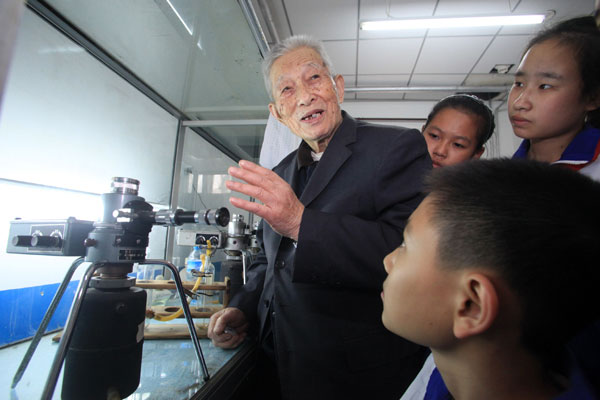A measure of dedication
Updated: 2011-11-23 07:26
By Tang Yue and Li Xiang (China Daily)
|
|||||||||
 |
|
Chu Zijia is a teacher at the tanggu No 2 Middle School in Tianjin.[Photo/China Daily] |
TIANJIN - For the past 36 years, Chu Zijia's daily routine has included fetching water from a well early every morning, putting it in a special instrument and making a measurement.
He has mixed feelings toward the answer - it rarely changes, which bores him. But if it fluctuates, it could bode bad news.
A teacher at Tanggu No 2 Middle School, Chu has been conducting seismic surveillance as a grassroots observer for the government since 1975. Even his retirement in 1988 didn't keep him from working with the monitors and students.
The 88-year-old still attends meetings at the local seismological bureau every month and hands in his data.
And he still lives at school. Here in his living room/office, his desk fights for space with personal possessions, prizes for the students, and, of course, the graph paper he uses to note daily statistics. Also scattered are the awards and prizes he has earned for his inventions and science education.
"To be frank, it's a job that easily wearies you. You just repeat what you did the day before and 99 percent of the time, you get the same answer after hours of work," said Chu.
"But the valuable statistics must be consistent so there is a record of every single day since the working station was founded."
After the 7.3-magnitude Haicheng earthquake in Liaoning struck in 1975 - the only major earthquake successfully forecast through the study of data - thousands of observation points were set up all over China.
Tanggu No 2 Middle School held one of them and Chu, then an English teacher, was assigned to run it.
The layman then bought books on seismology and went to lectures in Beijing and other neighboring provinces.
After mastering the theories and instruments, he set up a "seismology group" in the school and organized students to conduct the monitoring with him - a group he still runs today.
While the daily indicators always remained the same, the newly-recruited students kept him feeling fresh.
"Although it is hard for me to make a very sophisticated scientific study, giving some knowledge to the students - which may be helpful to them and their families in case of an earthquake - offers me a lot of sense of achievement," he told China Daily.
"To stay with young people all day long also keeps me feeling energetic," said Chu, who still has quite good eyesight and hearing.
Wang Wenliang, who studied here from 1978 to 1983, still remembers the golden time of the group.
"Tens of students thronged into his office after class and some even lived at school during vacations to work with him," said Wang, 45, who stills visits Chu every few weeks.
"We also raised some poultry and fish and observed them back then. It was really fun."
The strange behavior of animals was also one of the indicators used to predict the Haicheng earthquake.
Due to the pressure from schoolwork, very few students have time to deal with the meters every day, which can take up to two hours to produce a result. But many of them enjoy listening to his lectures.
Chu gives one lesson every week to the seismology group, which has 15 students. Besides the basic principles of earthquakes and the definitions of academic terms, he gives practical guidance like what to do if disaster strikes.
He has also organized quiz competitions twice a year since 1980. It was at first mainly about seismology and was then extended to include other popular sciences such as environmental protection and food safety.
"Grandpa Chu is almost 90 years old, but he is not behind the times," said Huang Zhen, a ninth-grade group member.
"He keeps updated with the latest news and gives us a lot of case studies, like the earthquake in Japan earlier this year. He knows very well what can best attract students," he said.
Chu's audience is not limited to his students. Every May, Chu leads the study group to disseminate thousands of tips on how to behave when an earthquake happens.
They visit the countryside, residential compounds, primary schools and food markets.
"People living in cottages should act differently from those living in high-rise buildings. The situation in the schools and on the streets is also different. So we prepare the materials to meet their specific needs," Chu said.
Chu's persistence has also been recognized by those in the seismological bureau.
"Thirty years ago, there were more than 100 amateur observers in our district, now there are only a few. Chu has always been the most dedicated one," said Gao Yuzhu, deputy chief of the seismological bureau in Binhai New Area.
"It is extremely hard for even professionals to forecast earthquakes, let alone amateurs. But his work provides us with great data support, which is very useful for long-term scientific research."











